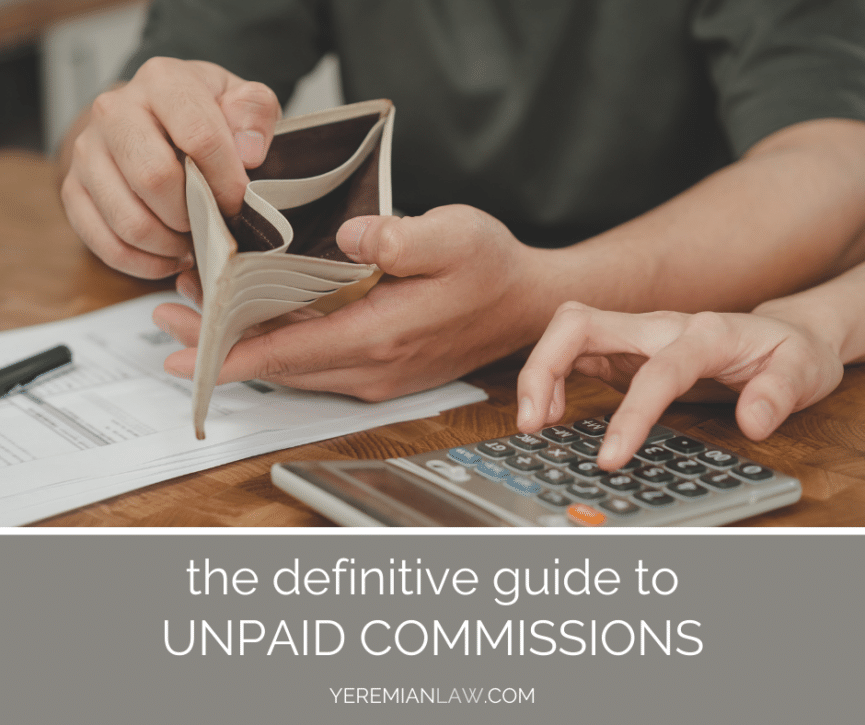Unpaid commissions in the state of California are monies that are earned by an employee but not paid out to them by their employer. These unpaid wages can be the result of an employer’s failure to pay commissions that are owed, or an employer’s illegal deduction of commission payments. Employees who are owed unpaid commissions may be able to recover these wages through the filing of a lawsuit against their employer.
Why Do Employers Fail to Pay Commissions in Some Cases?
There are a number of reasons why an employer might fail to pay commissions that are owed to their employees. In some cases, the employer may simply be delinquent in making commission payments. In other cases, the employer may have a policy or practice of not paying commissions until a sale is finalized, which can result in employees not being paid for work that they have already completed. Additionally, some employers may try to avoid paying commissions by misclassifying employees as independent contractors.
Related: 5 common ways employers violate wage and hour laws in California
How Are Commissions Usually Computed in California?
In the state of California, commissions are typically computed as a percentage of the sales that are generated by an employee. However, there are a few different ways that commissions can be computed, and the method that is used will depend on the particular circumstances of each case. In some cases, commissions may be paid based on the number of hours worked, or the amount of product that is sold. Additionally, some employers may have a policy of paying commissions only when a sale is finalized, while others may pay commissions on a monthly or yearly basis.
What is Not Considered a Commission Wage in California?
In the state of California, there are a few different types of payments that are not considered to be commission wages. These include tips, draw payments, and certain types of bonuses. Additionally, employers are not required to pay commissions on sales that are made outside of the state of California. Finally, employers are not required to pay commissions on sales that are made to government entities.
Related: The complete guide to exempt and nonexempt employees in California
What Are the Consequences of an Employer’s Failure to Pay Commissions?
An employer’s failure to pay commissions can have a number of consequences for both the employer and the employees. Employees who are owed unpaid commissions may be able to sue their employer and recover the unpaid wages, as well as any interest that has accrued. Additionally, employees may be able to recover punitive damages in some cases. Employers who fail to pay commissions may also be subject to penalties and fines from the state of California.
Related: Fair wages in California
What Happens to Your Commissions if You Quit or Your Employer Terminates You?
If you quit your job or are terminated by your employer, you may still be entitled to commissions that you have earned but not yet been paid. However, there are a few different factors that will determine whether or not you are entitled to these unpaid commissions. In some cases, you may be required to provide written notice to your employer of your intention to quit in order to receive your commissions. Additionally, your employer may have a policy or contract that states how long you must be employed in order to receive commissions. If you are unsure of whether or not you are entitled to unpaid commissions, you should speak with an experienced attorney who can advise you of your rights.
What Should You Do if Your California Employer Fails to Pay You Commissions?
If you believe that you are owed commissions by your California employer, there are a few different steps that you can take in order to recover these wages. First, you should try to resolve the issue directly with your employer. If your employer is unwilling or unable to pay you the commissions that you are owed, you may want to consider filing a claim with the California Division of Labor Standards Enforcement. Additionally, you may have the option of filing a lawsuit against your employer in order to recover the unpaid wages. If you are considering taking legal action, you should speak with an experienced attorney who can help you navigate the process.
Do You Need to Talk to an Attorney About Your Unpaid Commissions?
If you’re not sure what to do about unpaid commissions, we may be able to help you. Call our office at 818-230-8380 or fill out the form below to schedule your free consultation with an experienced attorney who can answer your questions and help you resolve your situation.




